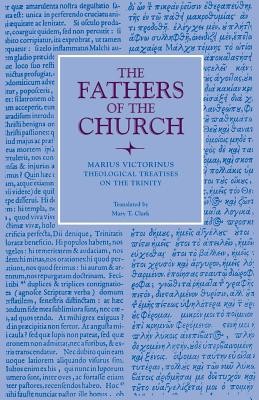
- We will send in 10–14 business days.
- Author: Marius Victorinus
- Publisher: Catholic University of America Press
- ISBN-10: 0813210909
- ISBN-13: 9780813210902
- Format: 14 x 21.6 x 2.1 cm, minkšti viršeliai
- Language: English
- SAVE -10% with code: EXTRA
Reviews
Description
Marius Victorinus, a contemporary of St. Ambrose and one who had considerable influence on St. Augustine--he has been styled "an Augustine before Augustine"--is an important Fourth-Century Neoplatonist. Before his conversion to Christianity Marius Victorinus wrote commentaries on works of Cicero and translated Aristotle's tracts on logic and some Neoplatonic books into Latin.
After his conversion, probably A.D. 354, he turned his vast learning to the composition of theological treatises in refutation of Arianism and the errors of Ursacius and Valens expressed in the Creed of Sirminum (357) as well as those of Basil of Ancyra and of the Homoeans in the credos of Sirmium and Rimini in 359.
The Theological Treatises on the Trinity contain the following: two letters, one from Candidus the Arian to the Rhetor Marius Victrorinus and the addressee's reply. Both documents are quite probably literary devices helping to bring into sharp focus the matters under discussion. These are followed by four books Against Arius, a short treatise demonstrating the necessity of accepting the term homoousios (of the same substance), and three Hymns, mostly in strophic structure, addressed to the Trinity and explaining the names and functions of the divine Persons in salvation history. In the Treatises Marius Victorinus adopts, in addition to the then traditional arguments, Neoplatonic concepts--adapted probably from Porphyry--to present a systematic explanation of the Trinity. Posthumous influences of the Treatises are discernible in works of Alcuin.
The present translation is made from the latest critical text and has profited greatly from the vast erudition of Pierre Henry and Paul Hadot.
EXTRA 10 % discount with code: EXTRA
The promotion ends in 22d.02:44:22
The discount code is valid when purchasing from 10 €. Discounts do not stack.
- Author: Marius Victorinus
- Publisher: Catholic University of America Press
- ISBN-10: 0813210909
- ISBN-13: 9780813210902
- Format: 14 x 21.6 x 2.1 cm, minkšti viršeliai
- Language: English English
Marius Victorinus, a contemporary of St. Ambrose and one who had considerable influence on St. Augustine--he has been styled "an Augustine before Augustine"--is an important Fourth-Century Neoplatonist. Before his conversion to Christianity Marius Victorinus wrote commentaries on works of Cicero and translated Aristotle's tracts on logic and some Neoplatonic books into Latin.
After his conversion, probably A.D. 354, he turned his vast learning to the composition of theological treatises in refutation of Arianism and the errors of Ursacius and Valens expressed in the Creed of Sirminum (357) as well as those of Basil of Ancyra and of the Homoeans in the credos of Sirmium and Rimini in 359.
The Theological Treatises on the Trinity contain the following: two letters, one from Candidus the Arian to the Rhetor Marius Victrorinus and the addressee's reply. Both documents are quite probably literary devices helping to bring into sharp focus the matters under discussion. These are followed by four books Against Arius, a short treatise demonstrating the necessity of accepting the term homoousios (of the same substance), and three Hymns, mostly in strophic structure, addressed to the Trinity and explaining the names and functions of the divine Persons in salvation history. In the Treatises Marius Victorinus adopts, in addition to the then traditional arguments, Neoplatonic concepts--adapted probably from Porphyry--to present a systematic explanation of the Trinity. Posthumous influences of the Treatises are discernible in works of Alcuin.
The present translation is made from the latest critical text and has profited greatly from the vast erudition of Pierre Henry and Paul Hadot.


Reviews